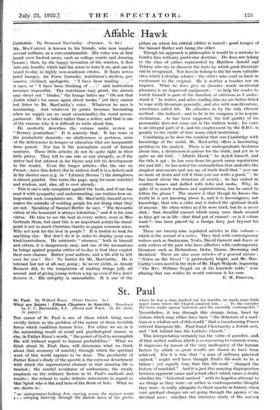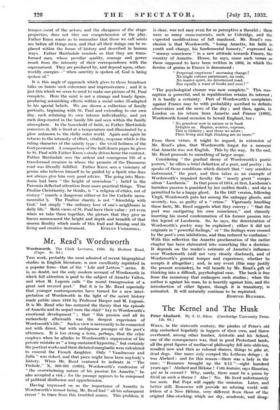St. Paul
St. Paul. By Wilfred Knox. (Peter Davies. 5s.) THE career of St. Paul is one of those which bring most vividly before us the problem of the nature of those invisible forces which condition human lives. For either we see in it the astonishing result of social and psychological causes, or else,-in Father Kaiox's words, "the power of God-to accomplish
His will without regard to human probabilities." What we think about St. Paul, -then, will determine what we think about that economy • Of sanctity through Which the spiritual work of this world appears to be done. The peculiarity of Father Knox's Study of the apostle is the;extreme detachment ` with which the supernatural element in that amazing life is treated ; the careful avoidance of enthusiasm, the steady emphasis on the ordinary factors -in St. Paul's methods and • results ; the refusal to make definite statements in regard to that Spirit who -is "-the teat hero otthe Book of Acts. • What we . are shown is : .
"an unimpressive-looking Jew, moying across the ancient world a creeping furtively the- ArrOir -140 . of the ghetto where he was a man marked out for murder, to reach some little upper room where the Church awaited him. . . . To the outsider the scene might appear ludicrous and the assembly contemptible." Nevertheless, it was through this strange being, beset by visions which may either have been " the delusions of a mad- man or a wisdom not of this world," that a transforming Power entered European life... Paul found Christianity a Jewish sect, and "left behind. him the Catholic Church."
This interpretation certainly has the value of paradox, and I of that surface realism which is so reassuring to common sense. It impresses_ by reason of the very inadequacy of the human ' factors by which so great results are shown to. have been achieved. For it is true that "a man of - ordinary practical -outlook " might well have thought Paul's life-work to be a failure' : , yet equally true that this life-work "changed the history of inankiiid." And it is just this amazing disproportion between apparent cause and actual effect which raise; a doubt whether the "-historical -method " with its hopeless attempt to see things as they were--or rather as contemporaries thought they were—is really adequate to those epochs in historY when vast spiritual changes are set going through the agency of in- dividual men : whether this intensive study of the uneven
tempero.ment of the actors, and the cheapness of the stage- properties, does not blur our comprehension of the play. Father Knox wants us to remember that those we call saints are before all things men, and that all their doings can be re- placed within the frame of history and described in human ways. Father Martindale reminds us that they are trans- formed men, whose peculiar quality, courage and power result from the intensity of their correspondence with the supernatural. They are produced by, and depend upon, other- worldly energies—" when sanctity is spoken of, God is being spoken of."
It is this angle of approach which gives to these broadcast talks on Saints such coherence and impressiveness ; and it is just this which we seem to need to make our picture of St. Paul complete. Here the saint is not a strange and lonely figure, producing astonishing effects within a social order ill-adapted to his special beliefs. We are shown a collection of family portraits, beginning with St. Paul and extending to our own day, each retaining its own intense individuality, and yet each deep-rooted in the family life and seen within the family atmosphere. In the household of faith, as Father Martindale conceives it, life is lived at a temperature and illuminated by a glow unknown to the chilly outer world. Again and again he returns to the intensity of effort, vitality, response which is the ruling character of the saintly type : the vivid holiness of the God-possessed. A comparison of the half-dozen pages he gives to St. Paul with Father Knox's study drives home the contrast. Father Martindale sees the ardent and courageous life of a transformed creature in whom the promise of the Damascus road was literally fulfilled. Father Knox sees a visionary of genius who believes himself to be guided by a Spirit who does not always give him very good advice. The going into Mace- donia had been "the height of unwisdom " ; belief in the Parousia deflected attention from more practical things. True Pauline Christianity, he thinks, is "a religion of ethics, not of ecstasy" (surely a dangerous either-or for the Catholic sacra- mentalist !). The Pauline charity is not "friendship with God," but simply "the ordinary love of one's neighbours in daily life." Both views of St. Paul have their value : yet even when we take them together, the picture that they give us leaves unmeasured the height and depth and breadth of that unseen Reality which made of this frail and flaming soul its















































 Previous page
Previous page